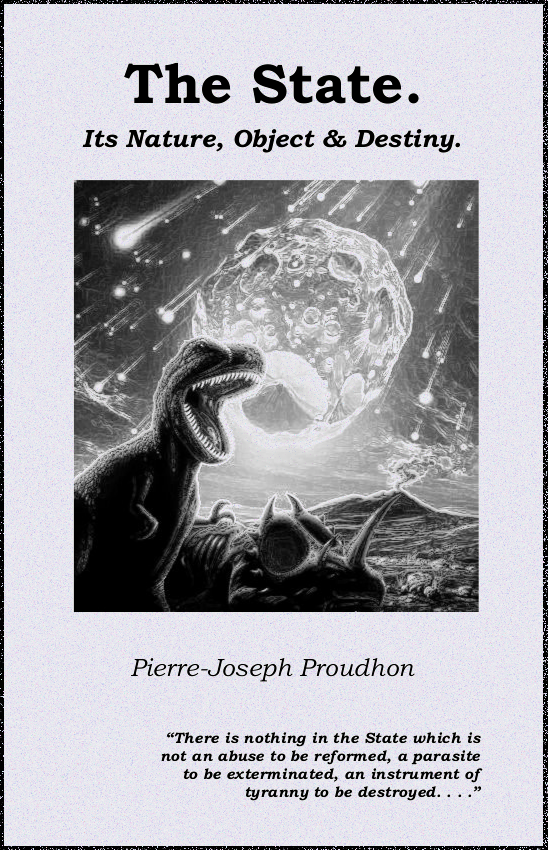C4SS has teamed up with the Distro of the Libertarian Left. The Distro produces and distribute zines and booklets on anarchism, market anarchist theory, counter-economics, and other movements for liberation. For every copy of Pierre-Joseph Proudhon’s “The State. Its Nature, Object, and Destiny.” that you purchase through the Distro, C4SS will receive a percentage. Support C4SS with Pierre-Joseph Proudhon’s “The State. Its Nature, Object, and Destiny.”
$2.00 for the first copy. $1.25 for every additional copy.
Anarchy is the condition of existence of adult society, as hierarchy is the condition of primitive society. […] There is nothing, absolutely nothing, in the State, from the top of its hierarchy to its foot, which is not an abuse to be reformed, a parasite to be exterminated, an instrument of tyranny to be destroyed. […]
Originally published in French in 1849, this classic revolutionary declaration first appeared in Pierre-Joseph Proudhon’s newspaper, La Voix du Peuple (December 3, 1849). Later translated into English by Benjamin Tucker, it appeared in two parts in Tucker’s paper Liberty. It remains one of the most powerful original statements of revolutionary Anarchism, its rejection of all forms of authoritarianism and reaction — even progressive reaction, or defenses of a socialist
state — and its defense of community autonomy and individual liberty. Proudhon asks, *What is the State?* and finds that the State is the embodiment of reaction, power, and authority; he asks, What is the destiny of the State? and he finds that its destiny is obsolescence and extinction.
“We maintain that, capital and labor once identified, society exists by itself, and has no further need of government. We are, therefore, as we have more than once announced,anarchists. Anarchy is the condition of adult society, as hierarchy is the condition of primitive society. […] We deny government and the State, because we affirm that which the founders of States have never believed in, the personality and autonomy of the masses. […] They accept a principle without troubling about its consequences; they cheer at the dethronement of capital and the emancipation of labor; then, when it remains to draw the antigovernmental conclusions from these premises, they protest, they continue to talk of politics and government, without inquiring whether government is compatible with industrial liberty and equality […] Government is to them the necessary and immutable a priori, the principle of principles, the eternal archeus. […]
“See, in fact, budget in hand, what the State is. The State is the army. Reformer, do you need an army to defend you? The State is the police. Reformer, do you need police? The State is the whole judicial system. The State is the treasury, the budget. Reformer, do you not desire the abolition of taxation? […] There is nothing, absolutely nothing, in the State, from the top of the hierarchy to its foot, which is not an abuse to be reformed, a parasite to be exterminated, an instrument of tyranny to be destroyed. And you talk to us of maintaining the State, of extending the functions of the State, of increasing the power of the State! Go to, you are not a revolutionist. […]”
Pierre-Joseph Proudhon (1809-1865) was a French mutualist, revolutionary, philosopher and social theorist. He participated in the revolutions of 1830 and 1848, and became an early advocate of socialism and the labor movement. As his conception of revolution turned him against all forms of government, he became the first social theorist to describe his own political views as Anarchist. Proudhon’s influence laid the foundation for the Anarchist social movement in Europe and America; his ideas directly inspired the collectivist Anarchism of Bakunin, the communist Anarchism of Kropotkin, and the mutualism and market Anarchism of Tucker, Lum, and Voltairine de Cleyre.








